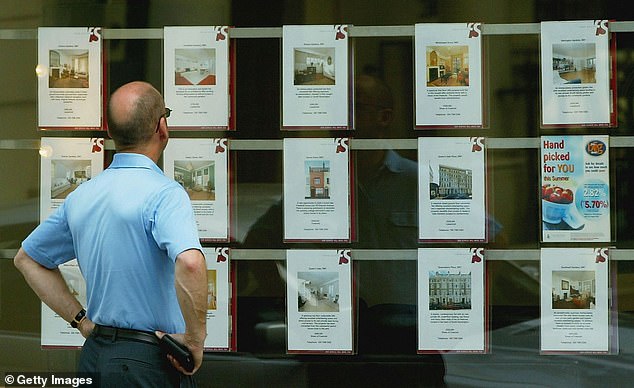Fixed-rate loans will fall below 4% within weeks due to a mortgage price war, experts say
Homeowners can look forward to fixed-rate loans set to fall below 4 percent within weeks amid a mortgage price war, experts said yesterday.
TSB has reduced the cost of its home loans by up to 0.35 percentage points from today.
The move follows a series of rate cuts announced this week by lenders including HSBC, Virgin Money and the Co-op.
Aaron Strutt, of broker Trinity Financial, said: 'I think we'll see a five-year fixed rate at 3.99 per cent early next year.'
It comes after the Bank of England yesterday voted to keep the key interest rate at 5.25 percent for the third time in a row, boosting hopes that mortgage costs have peaked.
Homeowners can look forward to fixed-rate loans set to fall below 4 percent within weeks amid a mortgage price war, experts said yesterday. TSB has cut the cost of its home loans by up to 0.35 percentage points from today (file image)

It comes after the Bank of England yesterday voted to keep the base rate at 5.25 percent for the third time in a row, boosting hopes that mortgage costs have peaked (file image)
The financial markets now expect interest rates to fall by one percentage point to 4.25 percent at the end of next year.
Bank of England Governor Andrew Bailey said that while Britain has “come a long way” in the fight against inflation, there is still more to go.
But his comments failed to dampen growing speculation among traders that a rate cut by banks is likely as early as May next year.
The financial markets predict that there is an almost one in three chance that this will happen as early as March.
They also expect a rapid series of cuts to occur afterward.
Confidence that the rate hikes may be over was further boosted by comments a day earlier from the head of the US Federal Reserve, the world's most powerful central bank. Fed chief Jerome Powell suggested the rate hike cycle had likely reached its peak.
The Bank of England would likely come under pressure not to be an outlier relative to the Fed and other central banks when they start cutting rates.
Yesterday, members of the Bank's rate-setting Monetary Policy Committee (MPC) voted to leave interest rates unchanged for the time being, as widely expected.
Still, three of the nine-member group supported a rate hike and there was no discussion of a possible cut during their meeting. The Bank said they should remain high 'for an extended period'.
However, markets have been betting for months that the Bank will cut rates faster than its rhetoric suggests. And the Fed news seemed to make that even more likely, with a May rate cut now considered a 70 percent probability.
Lower mortgage rates will ease the burden on the 1.5 million borrowers who will have to take out a new mortgage next year.

But even though the cost of home loans has fallen, homeowners will still be forced to take out a new mortgage at much higher rates than when they entered into their existing contract (file image)
But while the cost of home loans has fallen, homeowners will still be forced to take out a new mortgage at much higher rates than when they entered into their existing agreement.
The average two-year fixed rate mortgage rate is now 5.98 percent, compared to 2.34 percent before the first base rate increase in December 2021, according to Moneyfacts Compare.
For a homeowner with a £150,000 loan over 25 years, monthly payments on a new mortgage would increase by £304 from £661 to £965.
Five-year fixes have also risen dramatically and now stand at 5.58 percent, more than double the 2.64 percent available two years ago.
If the same homeowner were to sign a new five-year contract, their payments would increase by £245 per month, from £683 to £928.
The Bank has raised interest rates in an effort to reduce inflation, which peaked at 11.1 percent last fall after the war in Ukraine caused a spike in energy and food prices. This has since fallen to 4.6 percent.
That has prompted government ministers to declare victory, but the Bank of England, which wants to cut inflation to 2 percent, has been more cautious.
The Bank also announced that it now expects zero growth for the three-month period to December, a downward revision from its previous forecast.
